Kenneth C. Davis's Blog, page 14
March 27, 2023
Don’t Know Much About® Andrew Jackson
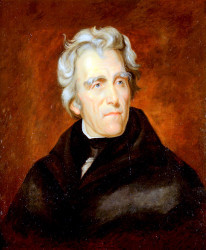
Imacon Color Scanner
(March 27, 2023: Revision of original post of March 15, 2014. Video created and directed by Colin Davis.)
Andrew Jackson, the seventh president of the United States, was born on March 15, 1767.
His birthplace was a cabin on the border of both South and North Carolina (the precise location is uncertain).
When this was last posted, he had fallen from favor and was going to be moved to the back side of the $20 in favor of Harriet Tubman. That decision was shelved by the previous administration and is back on track under the Biden administration.
In his day and ever since, Andrew Jackson provoked high emotions and sharp opinions. Thomas Jefferson once called him, “A dangerous man.”
His predecessor as president, John Quincy Adams, a bitter political rival, said Jackson was,
“A barbarian who could not even write a sentence of grammar and could hardly spell his own name.”
His place and reputation as an Indian fighter began with a somewhat overlooked fight against the Creek nation led by a half-Creek, half-Scot warrior named William Weatherford, or Red Eagle following an attack on an outpost known as Fort Mims north of Mobile, Alabama.
The video above offers a quick overview of Weatherford’s war with Jackson that ultimately led the demise of the Creek nation.Like Pearl Harbor or 9/11, it was an event that shocked the nation. Soon, Red Eagle and his Creek warriors were at war with Andrew Jackson, the Nashville lawyer turned politician, who had no love for the British or Native Americans.
On March 27, 1814, Jackson’s troops defeated Red Eagle and his Creek warriors, killing more than 800 Natives–women, children, and the elderly as well as warriors. Jackson’s soldiers cut off the noses of the dead to tally their numbers. Other soldiers cut off strips of skin to make reins for their horses. (A Nation Rising, page 66-68)
On August 9, 1814, Major General Andrew Jackson signed the Treaty of Fort Jackson ending the Creek War. The agreement provided for the surrender of twenty-three million acres of Creek land to the United States. This vast territory encompassed more than half of present-day Alabama and part of southern Georgia.
Resources from Library of Congress.
The complete story of the Red Creek War is told in my book A Nation Rising.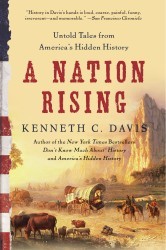
Andrew Jackson died on June 8, 1845. He was surrounded by many of the household servants he had enslaved. He told them:

Tombstone of Alfred Jackson, enslaved servant of Andrew Jackson. (Author photo © 2010)
“I want all to prepare to meet me in heaven….Christ has no respect to color.”
The story of one of those people, Alfred Jackson, is told in my recent book, In the Shadow of Liberty. Alfred Jackson is buried in the garden at the Hermitage, near Andrew Jackson’s gravesite.
The post Don’t Know Much About® Andrew Jackson first appeared on Don't Know Much.
March 26, 2023
“A lover’s quarrel with the world”-Robert Frost
[Updated March 26, 2023; Originally published August 2009; video edited and created by Colin Davis. One correction: I no longer have a home in Vermont mentioned in the video, but have not lost my admiration for Robert Frost.]
America’s Poet, Robert Frost, was born on March 26, 1874 –not in New England where so many of his greatest poems are set but in San Francisco.
The first poet invited to speak at a Presidential inaugural, Frost told the new President:
Be more Irish than Harvard. Poetry and power is the formula for another Augustan Age. Don’t be afraid of power.
–“Poetry and Power,” Poets.org
Apples, birches, hayfields and stone walls; simple features like these make up the landscape of four-time Pulitzer Prize winner Robert Frost’s poetry. Known as a poet of New England, Frost (1874-1963) spent much of his life working and wandering the woods and farmland of Massachusetts, Vermont, and New Hampshire.
As a young man, he dropped out of Dartmouth and then Harvard, then drifted from job to job: teacher, newspaper editor, cobbler. His poetry career took off during a three-year trip to England with his wife Elinor where Ezra Pound aided the young poet. Frost’s language is plain and straightforward, his lines inspired by the laconic speech of his Yankee neighbors.
But while poems like “Stopping by Woods on a Snowy Evening” are accessible enough to make Frost a grammar-school favorite, his poetry is contemplative and sometimes dark—concerned with themes like growing old and facing death. One brilliant example is this poem about a young boy sawing wood, Out, out–
The buzz-saw snarled and rattled in the yard
And made dust and dropped stove-length sticks of wood,
A brief biography of Robert Frost can be found at Poets.org, where there are more samples of his poetry. It includes an account of Frost and JFK.
Frost died on January 29, 1963, in Boston. After his death, an unsigned editorial in the The New York Times, entitled “Ending in Wisdom,” noted:
Robert Frost was more than America’s best-known poet. He was a national figure, almost an institution, a man who went up and down the land saying his poems wherever, it sometimes seemed, two or three Americans were gathered together. He spoke in the language of the common man.
New York Times, January 31, 1963

Robert Frost (Courtesy Library of Congress)
One of my favorite places in Vermont is the Frost grave-site in the cemetery of the First Church in Old Bennington -just down the street from the Bennington Monument, where this video was recorded.
I had a lover’s quarrel with the world
–Robert Frost’s epitaph
The post “A lover’s quarrel with the world”-Robert Frost first appeared on Don't Know Much.
March 21, 2023
GREAT SHORT BOOKS: A Year of Reading–Briefly

Two boxes of beautiful finished books have arrived (Author photo)
GREAT SHORT BOOKS:
A YEAR OF READING — BRIEFLY
NOW AVAILABLE
Scribner/Simon & Schuster and Simon Audio (Unabridged audio download)
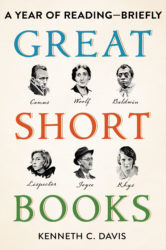
“An exciting guide to all that the world of fiction has to offer in 58 short novels — from ‘The Great Gatsby’ and ‘Lord of the Flies’ to the contemporary fiction of Colson Whitehead and Leïla Slimani — that, ‘like a first date,’ offer pleasure and excitement without commitment.” New York Times Book Review
Booklist “Editors’ Choice Adult Books 2022″
“…The most exceptional of the best books of 2022 reviewed in Booklist…”
“Delightfully accessible, Great Short Books: A Year of Reading–Briefly presents 58 fact-filled reviews of short books, a smorgasbord of titles sure to entice readers.” –Cheryl McKeon, Shelf Awareness
“I consider Davis’ ‘Great Short Books’ a gift to readers, a true treasure trove of literary recommendations.” —Sue Gilmore, SFGate
“Anyone who’s eternally time-strapped will treasure Kenneth C. Davis’ Great Short Books. This nifty volume highlights 58 works of fiction chosen by Davis for their size (small) and impact (enormous). Each brisk read weighs in at around 200 pages but has the oomph of an epic.” —Bookpage Full Review
“An entertaining journey with a fun, knowledgeable guide…. “ Kirkus Reviews
“A must-purchase for public and school libraries.” ALA Booklist
FIRST TRADE REVIEWS FROM KIRKUS, PUBLISHERS WEEKLY, BOOKLIST
“Davis feels that novels of 200 pages or less often don’t get the recognition they deserve, and this delightful book is the remedy…A must-purchase for public and school libraries.” *Starred Booklist review
“An entertaining journey with a fun, knowledgeable guide…. His love of books and reading shines through. From 1759 (Candide) to 2019 (The Nickel Boys), he’s got you covered.” –Kirkus Reviews
Full KIRKUS review here
“Davis’s conversational tone makes him a great guide to these literary aperitifs. This is sure to leave book lovers with something new to add to their lists.” FULL PUBLISHERS WEEKLY REVIEW here
During the lock-down, I swapped doom-scrolling for the insight and inspiration that come from reading great fiction. Inspired by Boccaccio’s “The Decameron” and its brief tales told during a pandemic, I read 58 great short novels –not as an escape but an antidote.
“A short novel is like a great first date. It can be extremely pleasant, even exciting, and memorable. Ideally, you leave wanting more. It can lead to greater possibilities. But there is no long-term commitment.”
–From “Notes of a Common Reader,” the Introduction to Great Short Books
Read “The Antidote to Everything,” an excerpt from the Introduction published on Lit Hub
The result is a compendium that goes from “Candide” to Colson Whitehead, and Edith Wharton to Leïla Slimani. And yes, Maus and many other Banned Books and Writers.

What “A Year of Reading–Briefly” looks like

Voltaire in Great Short Books
Art © Sam Kerr

Edith Wharton in Great Short Books
Art © Sam Kerr
Advance Praise for Great Short Books: A Year of Reading—Briefly
“GREAT SHORT BOOKS is a fascinating, thoughtful, and inspiring guide to a marvelous form of literature: the short novel. You can dip into this book anywhere you like, but I found myself reading it cover-to-cover, delighting in discovering new works while also revisiting many of my favorites. GREAT SHORT BOOKS is itself a great book—for those who are over-scheduled but want to expand their reading and for those who will simply delight in spending time with a passionate fellow reader who on every page reminds us why we need and love to read.”
–Will Schwalbe, New York Times bestselling author of THE END OF YOUR LIFE BOOK CLUB
“This is the book that you didn’t know you really needed. I began digging into this book as soon as I got it, and it was such a delight to read beautiful prose, just a sip at a time, with Kenneth Davis’ notes to give me context and help me more fully appreciate the stories. Keep this book near your bed or on your coffee table. It will be read and loved.”
–Celeste Headlee, journalist and author of WE NEED TO TALK and SPEAKING OF RACE

Recording audio book of Great Short Books (Sept. 2022) Photo by Katherine Cook
From hard-boiled fiction to magical realism, the 18th century to the present day, Great Short Books spans genres, cultures, countries, and time to present a diverse selection of acclaimed and canonical novels—plus a few bestsellers. Like browsing in your favorite bookstore, this eclectic compendium is a fun and practical book for any passionate reader hoping to broaden their collection— or anyone who is looking for an entertaining, effortless reentry into reading.
Listen to a sample of the audio book of Great Short Books
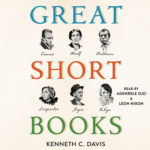
And Indie booksellers weigh in:
“Need something grand, something classic, uh…. something short to read, but don’t know where to start? Check out Kenneth Davis’s guide to Great Short Books and you’ll soon find just the right tale to delight your literary palate. For each suggestion, Davis gives us first lines, a plot summary, an author’s bio, a reason for reading it, and, finally, what you should read next from the author’s canon. Pick up a copy… you’ll be glad you did. You’re welcome!”—Linda Bond, Auntie’s Bookstore (Spokane, WA)
“Kenneth Davis has presented the perfect solution for too many books, not enough time—a collection of exceptional short books perfect for reading in a society seemingly without any free time. Many of the books may be familiar by name, some are obscure, some even forgotten, but all belong in the canon of superb literature. He teases with a brief synopsis and explains why each book deserves attention. An absolutely intriguing bonus is a short biographical sketch of each author, many of whom had fascinating but traumatic lives. It is the perfect book to provide comfort literature for busy readers.”—Bill Cusumano, Square Books (Oxford, Miss.)
More early reviews from readers at NetGalley.com
“GREAT SHORT BOOKS is a wonderful, breezy but deep look at the outstanding short books of the last 150 years. Kenneth C. Davis is a genius at summarizing each book and making the reader want to read said book post haste. This is a book I didn’t know the world needed but the world did.” –Tom O., reviewer
“…an incredibly valuable tool for book clubs and readers everywhere! Some authors/titles are well-known and others will be new discoveries….HIGHLY RECOMMENDED for any book group looking to find new titles or any reader who wants to know what to read next.” –Ann H. reviewer
“I found over a dozen new authors or titles I want to now read that were included in his main list, and the Further Reading at the end of each chapter and at the end of the volume itself.
As others have suggested, this is a great tool for Book Clubs!
Not Lit Crit, it is mostly focused on necessary, just-the-facts-mam information on one person’s reading of short books over a year. Well worth a read, and great for browsing!” –Stephen B., Librarian
“What better way to introduce new readers to more than 50 ‘short’ books. This handy book is full of non-spoiler descriptions and cultural context that situate these stories within our world.” –Kelsey W., librarian
S0urce: Great Short Books via NetGalley
I can’t wait to start talking about this book with readers everywhere.
Teachers, Librarians, Book Clubs and Other Learning Communities:
Invite me for a visit to your school, classroom, library, historical group, book club or conference.
The post GREAT SHORT BOOKS: A Year of Reading–Briefly first appeared on Don't Know Much.
March 17, 2023
“Why Books Matter: ‘Books Are Weapons in the War of Ideas'”
In the current environment of book banning and the attempt to alter what we teach in American History, I believe we are in the midst of a “War of Ideas.” It is one reason I wrote this article: “Why Books Matter: ‘Books Are Weapons in the War of Ideas'” It appears in the January-February issue of Social Education, the journal of the National Council for the Social Studies (NCSS).
It offers an overview of censorship and my thoughts on the current conflict. Book banning has a long history. But we are at a significant moment when the stakes have rarely been higher.
You can also read my earlier related piece: “When Robin Hood Was Blacklisted”
And as I point out, more than half of the 58 writers included in my new book, Great Short Books: A Year of Reading–Briefly, were also banned, censored, or suppressed. Several had their works burned.

The post “Why Books Matter: ‘Books Are Weapons in the War of Ideas'” first appeared on Don't Know Much.
March 16, 2023
Don’t Know Much About® Mr. Madison
March 16 marks the anniversary of the birth in 1751 of America’s fourth President, James Madison, also known as “The Father of the Constitution.”
Like George Washington and Thomas Jefferson, his Virginia predecessors in the presidency, Madison embodied the “Great Contradiction”– that a nation “conceived in liberty” was also born in shackles.
READ MY ARTICLE “THE AMERICAN CONTRADICTION,” on teaching the history of American slavery in Social Education.
Small in stature and overshadowed by the more famous Washington and Jefferson, Madison is counted among of the greatest of the Founding Fathers for the breadth and influence of his contributions. Like many of the Founders, Madison had reservations about slavery as a contradiction to this ideals, but did little to end the institution. He hoped that slavery would end after the foreign trade was abolished and thought that enslaved African-Americans should be emancipated and returned to Africa.
The story of Paul Jennings, who was enslaved by Madison and wrote a memoir of working as a servant in the White House, is told in my book IN THE SHADOW OF LIBERTY.
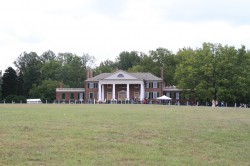
Montpelier, home of James Madison (Photo: Kenneth C. Davis, 2010)
James Madison was born on March 16, 1751 in Port Conway, Virginia. The son of a tobacco planter and somewhat sickly as a child, he went north to study at the College of New Jersey (now Princeton). There he came under the influence of the college President, John Witherspoon, a future signer of the Declaration of Independence, and made a friend of fellow student, Aaron Burr, son of the College’s founder.
Returning to Virginia, Madison became involved in patriot politics and became a close colleague of his neighbor Thomas Jefferson, serving as Jefferson’s adviser and confidant during the war years while Jefferson was Governor of Virginia.
In 1794, he married the widow Dolley Payne Todd, having been formally introduced by his college friend Aaron Burr.
A few Madison Highlights:
•Secured passage of the Virginia Act for Establishing Religious Freedom (1786), an act that is a cornerstone of religious freedom in America. As part of that effort, he wrote the influential Memorial and Remonstrance Against Religious Assessments. (I discuss the “Remonstrance” in my article “America’s True History of Religious Tolerance” in the October 2010 Smithsonian.)
•Was the moving force behind the Constitutional Convention and was one of the principal authors of the Constitution. Madison’s support of the electoral system is laid out in this essay by Yale professor Akhil Reed Amar “The Troubling Reason the Electoral College Exists.”
•With Alexander Hamilton and John Jay was one of the authors of The Federalist Papers (Resources from the Library of Congress), arguments in favor of the ratification of the Constitution
•Was principal author of the Bill of Rights, which he originally thought unnecessary
Following ratification of the Constitution, Madison was a member of the House of Representatives from Virginia and a powerful Congressional ally of George Washington.
•Drafted the first version of Washington’s Farewell Address
•Supervised the Louisiana Purchase as Thomas Jefferson’s Secretary of State
•Presided over the ill-prepared nation during the War of 1812, the “second war of independence”
I believe there are more instances of the abridgment of the freedom of the people by gradual and silent encroachments of those in power than by violent and sudden usurpations. –June 16, 1788
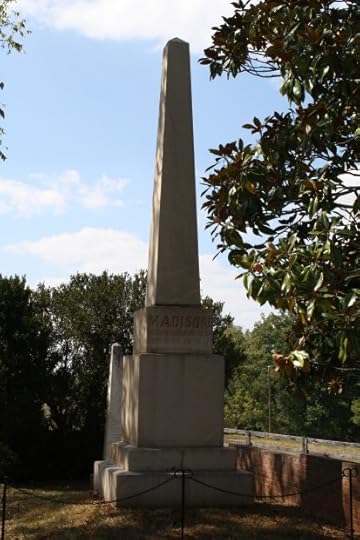
Madison’s grave at Montpelier (Author photo 2010)
Madison died on June 28, 1836 at Montpelier, at age 85. Enslaved servant Paul Jennings was at his bedside and later recalled in a memoir that Madison died, “as quietly as the snuff of a candle goes out.”
James Madison is buried at Montpelier.

LINKS:
The Library of Congress Resource Collection on James Madison.
Madison’s Major Papers and Inaugural Addresses can be found at the Avalon Project of the Yale Law School.
The post Don’t Know Much About® Mr. Madison first appeared on Don't Know Much.
March 2, 2023
Who Said It? “I must study politiciks and war…”
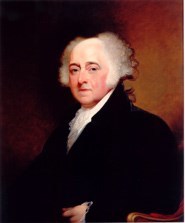
John Adams portrait by Gilbert Stuart
John Adams, writing to his wife Abigail from Paris (May 12, 1780)
I must study Politicks and War that my sons may have liberty to study Mathematicks and Philosophy. My sons ought to study Mathematicks and Philosophy, Geography, natural History, Naval Architecture, navigation, Commerce and Agriculture, in order to give their Children a right to study Painting, Poetry, Musick, Architecture, Statuary, Tapestry and Porcelaine.
Source: New England Historical Society
The post Who Said It? “I must study politiciks and war…” first appeared on Don't Know Much.
February 17, 2023
“Why Books Matter: ‘Books Are Weapons in the War of Ideas'”
In the current environment of book banning and the attempt to alter what we teach in American History, I believe we are in the midst of a “War of Ideas.” It is one reason I wrote this article: “Why Books Matter: ‘Books Are Weapons in the War of Ideas'” It appears in the January-February issue of Social Education, the journal of the national Council for the Social Studies (NCSS).
It offers an overview of censorship and my thoughts on the current conflict. Book banning and burning are older than books. But we are at a significant moment when the stakes have rarely been higher.
You can also read my earlier related piece: “When Robin Hood Was Blacklisted”
And as I point out, more than half of the 58 writers included in my new book, Great Short Books: A Year of Reading–Briefly, were also banned, censored, or suppressed. Several had their works burned.

The post “Why Books Matter: ‘Books Are Weapons in the War of Ideas'” first appeared on Don't Know Much.
February 7, 2023
Who Said It? (2/7/2013)
George Washington in a letter to Robert Morris, April 12, 1786
I hope it will not be conceived from these observations, that it is my wish to hold the unhappy people who are the subject of this letter, in slavery. I can only say that there is not a man living who wishes more sincerely than I do, to see a plan adopted for the abolition of it—but there is only one proper and effectual mode by which it can be accomplished, & that is by Legislative authority: and this, as far as my suffrage will go, shall never be wanting.
Source: The Founders Archives

The post Who Said It? (2/7/2013) first appeared on Don't Know Much.
George Washington in a letter to Robert Morris, April 12,...
George Washington in a letter to Robert Morris, April 12, 1786
I hope it will not be conceived from these observations, that it is my wish to hold the unhappy people who are the subject of this letter, in slavery. I can only say that there is not a man living who wishes more sincerely than I do, to see a plan adopted for the abolition of it—but there is only one proper and effectual mode by which it can be accomplished, & that is by Legislative authority: and this, as far as my suffrage will go, shall never be wanting.
Source: The Founders Archives

The post first appeared on Don't Know Much.
“Two Societies, One Black, One White”
(Revised post 1/27/2023; originally published on February 29, 2016)
An appropriate reminder that the Kerner Commission report was issued in February –now marked as Black History Month. But there are too many people who would erase this history.
“Although specific grievances varied from city to city, at least 12 deeply held grievances can be identified and ranked into three levels of relative intensity:
First Level of Intensity
1. Police practices” –The Kerner Report, February 1968
Once again, the United States is confronted by horrifying images of a Black man being pummeled and beaten to death by police officers. These images evoke the familiar sense of disgust, horror and outrage.
But this latest incident is another reminder of a past the country cannot seem to escape. We have been down this road too many times before. And are now coming up to the anniversary of the 1968 Kerner Report that addressed violence in many large urban neighborhoods. The first problem the Commission pointed to was “police practices.”
Remember what President Lyndon B. Johnson said when he announced a formal investigation in rioting in 1967?
–What happened?
–Why did it happen?
–What can be done to prevent it from happening again and again?
-President Lyndon B. Johnson in announcing the formation of a commission to investigate urban violence in 1967.
Once again, it is necessary to revisit the Kerner Commission, formed more than fifty years years ago to address violence in American cities.
On July 27, 1967, President Lyndon B. Johnson established an 11-member National Advisory Commission on Civil Disorders. He was responding to a series of violent outbursts in predominantly Black urban neighborhoods in such cities as Detroit and Newark.

Time Magazine cover August 4, 1967
On July 29, 1967, President Johnson made remarks about the reasons for the commission:
The civil peace has been shattered in a number of cities. The American people are deeply disturbed. They are baffled and dismayed by the wholesale looting and violence that has occurred both in small towns and in great metropolitan centers.
No society can tolerate massive violence, any more than a body can tolerate massive disease. And we in America shall not tolerate it.
But just saying that does not solve the problem. We need to know the answers, I think, to three basic questions about these riots:
–What happened?
–Why did it happen?
–What can be done to prevent it from happening again and again?
Source: Lyndon B. Johnson, Remarks Upon Signing Order Establishing the National Advisory Commission on Civil Disorders. Online by Gerhard Peters and John T. Woolley, The American Presidency Project
On Feb. 29, 1968, President Johnson’s National Advisory Commission on Civil Disorders, later known as the Kerner Commission after its chairman, Governor Otto Kerner, Jr. of Illinois, issued a stark warning:
“Our Nation Is Moving Toward Two Societies, One Black, One White—Separate and Unequal”

Governor of Illinois Otto Kerner, Jr., meeting with Roy Wilkins (left) and President Lyndon Johnson (right) in the White House. 29 July 1967 Source LBJ Presidential Library
The Committee Report went on to identify a set of “deeply held grievances” that it believed had led to the violence.
Although almost all cities had some sort of formal grievance mechanism for handling citizen complaints, this typically was regarded by Negroes as ineffective and was generally ignored.
Although specific grievances varied from city to city, at least 12 deeply held grievances can be identified and ranked into three levels of relative intensity:
First Level of Intensity
1. Police practices
2. Unemployment and underemployment
3. Inadequate housing
Second Level of Intensity
4. Inadequate education
5. Poor recreation facilities and programs
6. Ineffectiveness of the political structure and grievance mechanisms.
Third Level of Intensity
7. Disrespectful white attitudes
8. Discriminatory administration of justice
9. Inadequacy of federal programs
10. Inadequacy of municipal services
11. Discriminatory consumer and credit practices
12. Inadequate welfare programs
Source: “Our Nation is Moving Toward Two Societies, One Black, One White—Separate and Unequal”: Excerpts from the Kerner Report; American Social History Project / Center for Media and Learning (Graduate Center, CUNY)
and the Roy Rosenzweig Center for History and New Media (George Mason University).
Issued more than half a century ago, the list of grievances reads as if it could have been written today.
“Moreover, the report deplored a common reaction to riots: arming police officers with more deadly weapons to use in heavily populated urban neighborhoods. Its primary recommendation was ‘a policy which combines ghetto enrichment with programs designed to encourage integration of substantial numbers of Negroes into the society outside the ghetto.’” —Smithsonian
The post “Two Societies, One Black, One White” first appeared on Don't Know Much.



